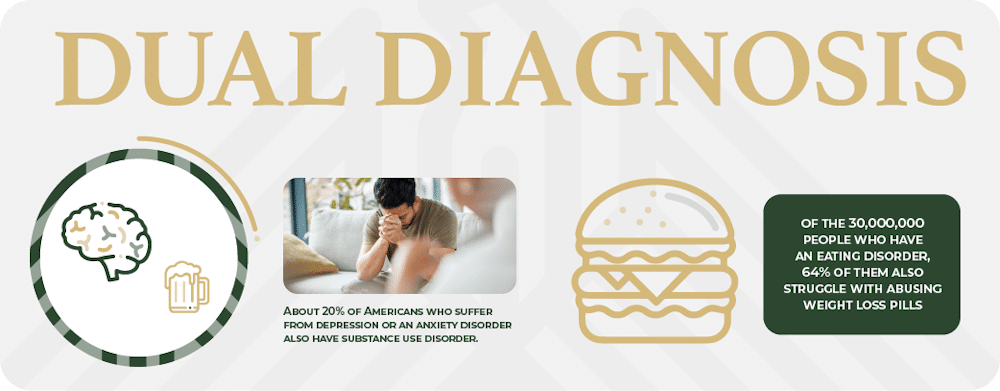Dual Diagnosis Treatment Center in Idaho
Addiction and mental illness commonly co-occur more than most people realize. In 2019, a study conducted by the National Survey on Drug and Health (NSDUH) discovered that roughly 9.5 million adults in the United States were suffering from addiction as well as mental health conditions. Another private study conducted in 2020 showed that nearly 8.25% (out of 70,000 respondents) were suffering from co-occurring disorders. The biggest group was those individuals that were currently unemployed, almost 12%.
Individuals suffering from co-occurring disorders are often unaware of the prevalence of one or more conditions. This is because many people don’t recognize the symptoms and many treatment providers may not test for more than one disorder. This is what makes dual diagnosis treatment extremely important in recognizing co-occurring disorders, but also treating and managing them effectively.
What Is Dual Diagnosis?
A dual diagnosis is commonly referred to as the presence of both a mental health disorder and a substance abuse disorder. However, dual diagnosis can also be the presence of any two behavioral health conditions. This means someone suffering from two mental health conditions or someone suffering from a process addiction and substance use disorder can qualify for dual diagnosis. This is also referred to as “co-occurring disorders.” These disorders can be either mild or severe and can greatly affect an individual’s quality of life.
A dual diagnosis treatment facility will work to diagnose the individual appropriately to make sure to identify the presence of all behavioral health conditions. This is extremely important to make sure that treatment types do not conflict with each other, and that the person can heal from both conditions. Ignoring one condition makes it much more likely that the person will relapse or be unable to manage their condition after treatment.
Does Addiction Cause Mental Health Disorders to Occur?
There is evidence that yes, this is the case. However, it’s also true that mental health disorders make a person more susceptible to addiction as well. This means that having one condition can make you more susceptible to the other. Dual diagnosis treatment centers understand that there is a strong correlation between the two and will work with each individual to design a treatment plan that meets all of their needs.
How Common Is Dual Diagnosis?
Dual diagnosis is a relatively common occurrence. Dual diagnosis is thought to occur in about 50% of all substance abuse cases. This means that if you or someone you love is struggling with addiction, there’s a good chance that there is an underlying mental health disorder as well.
More Statistics on Dual Diagnosis
- Of those individuals suffering from dual diagnosis, 37% (roughly 3.6 million adults) were suffering from the presence of a serious mental illness.
- Of those who suffer from a dual diagnosis, only 7.4% receive treatment for both conditions.
- Adults that fell within the age group 18-26 had the highest rate of dual diagnosis with 7.6% reporting suffering from two or more conditions.
- The rate of clients in treatment for co-occurring disorders has risen from 40% in 2009 to 48% in 2019.
- People with dual diagnosis are more likely to attempt suicide than those who only suffer from one condition or the other.
- Studies indicate that women are often more likely than men to suffer from co-occurring disorders as well as suffering from more serious mental illnesses.
Contact Eagle Creek Ranch
Recovery Today!
Why Wait? Find The Help You Need By Reaching Out To Us Today! Our Admissions Team Is Standing By.
Symptoms of Dual Diagnosis
There are a few different symptoms that may be indicative of dual diagnosis. If you or someone you know is displaying any of the following symptoms, it’s important to reach out for help:
- A sudden change in mood or behavior
- Withdrawal from friends and activities
- Problems at work or school
- Financial difficulties
- Legal trouble
- Multiple failed attempts to quit using substances
- Anxiety
- Depression
- Paranoia
- Isolation
- Violent or angry behaviors
This is not an all-encompassing list of symptoms, there are many other can co-occurring disorders present. It’s important to recognize the changes in a person’s behavior that may indicate a problem.
Signs That You Or A Loved One Has a Dual Diagnosis
Dual diagnosis symptoms can have a major impact on every area of your life. When left untreated, dual diagnosis disorders can lead to homelessness, job loss, legal problems, and even death. Even small things like leaving the house can cause a person great anxiety or fear. The symptoms of co-occurring disorders can be debilitating.
If your loved one is having difficulty with simple everyday tasks they may be suffering from a dual diagnosis.
Why do Dual Diagnosis Disorders Often Go Untreated?
Symptoms of dual diagnosis can be dismissed as other issues, and therefore they can go undiagnosed. Also, because dual diagnosis disorders often involve substance abuse, the person may not seek help out of fear of being judged. Mental health stigma can also play a role in why dual diagnosis disorders go untreated.
The most important step in dual diagnosis treatment is admitting that there is a problem. If you or a loved one are struggling with addiction and a mental illness, it’s important to speak to treatment professionals.
Common Co-Occurring Disorders
A dual diagnosis can occur with any mental health, or behavioral health conditions. Here is a list of the most common.
Anxiety disorders are the most common mental health disorders. Anxiety can manifest as fear, worry, and nervousness. People with anxiety often turn to drugs or alcohol to self-medicate.
Depression is a serious mood disorder that causes a person to feel hopeless, helpless, and worthless. Depression can lead to substance abuse as people try to cope with their feelings.
Bipolar disorder is a mental health condition that causes extreme mood swings. People with bipolar disorder may abuse drugs or alcohol to self-medicate their symptoms.
Trauma is a shocking or stressful event that can cause lasting damage. People who have experienced trauma may develop post-traumatic stress disorder (PTSD). PTSD can lead to substance abuse as people try to cope with their memories and feelings.
OCD is a mental health condition that causes repetitive, intrusive thoughts and compulsive behaviors. People with OCD may abuse drugs or alcohol to try to calm their anxiety.
Eating disorders are serious mental health conditions that can lead to dangerous behaviors. People with eating disorders may abuse drugs or alcohol as they try to control
Schizophrenia is a mental health condition that causes hallucinations, delusions, and disordered thinking. People with schizophrenia may abuse drugs or alcohol to try to self-medicate their symptoms.
Dual Diagnosis Treatment Options
Individualized treatment plans are critical for dual diagnosis patients because each person’s situation is unique. A good dual diagnosis treatment center will have a variety of programs and services available to meet the needs of each individual patient.
Some common components of dual diagnosis treatment include:
Psychotherapy: This type of therapy can help patients understand their thoughts, feelings, and behaviors to make positive changes.
Medication management: Medication can be an important part of treatment for dual diagnosis patients, especially those with schizophrenia or bipolar disorder.
Addiction education: Addiction treatment programs can help dual diagnosis patients recover by utilizing drug and alcohol education so they can better understand how addiction occurs.
Case management: Dual diagnosis patients may benefit from case management services, which can help them navigate the mental health and social service systems.
Support groups: Participation in a support group can help dual diagnosis patients feel less alone and more supported by others in similar circumstances.
What are the Benefits of Dual Diagnosis Treatment?

- Improved mental and physical health
- Increased ability to function in day-to-day life
- Improved relationships with family and friends
- Increased employment opportunities
- Improved quality of life.
Dual diagnosis treatment centers offer hope for those struggling with addiction and mental illness. dual diagnosis treatment facilities provide comprehensive care that treats both disorders at the same time. By treating both disorders, dual diagnosis treatment centers help people recover from addiction and mental illness and live happy and healthy lives.
Importance of Treating Dual Diagnosis Simultaneously
This form of treatment is highly individualized and must be designed so that treatment types do not interfere with each other. Dual diagnosis treatment centers understand that addiction and mental illness are both serious disorders that need to be treated simultaneously.
Dual diagnosis treatment facilities use a variety of treatment modalities to treat both disorders at the same time. By treating both disorders, dual diagnosis treatment centers can tailor treatment specifically to the individual’s unique circumstance. No two cases are the same, therefore treatment must always be unique and client-centered.
What to Expect at a Dual Diagnosis Treatment Center
When you arrive at a dual diagnosis treatment center, you will undergo an initial assessment. This assessment will help the staff at the dual diagnosis treatment center understand your unique situation and develop a treatment plan that is right for you. The staff at dual diagnosis treatment centers are highly trained and experienced in treating dual diagnosis disorders. They will work with you to create a structured treatment plan. This specific treatment regimen will be reviewed regularly to be sure your recovery is improving.
Dual Diagnosis Treatment is Available at Eagle Creek Ranch Recovery
At Eagle Creek Ranch Recovery, we understand how difficult it can be to live with a dual diagnosis. That’s why we offer comprehensive dual diagnosis treatment in a safe and nurturing environment.
Our highly trained staff is dedicated to helping you heal physically, mentally, and emotionally. Contact us today to learn more about our dual diagnosis treatment program.

Clinical Director
Kendall Maloof is the clinical director at Eagle Creek Ranch Recovery. She is a licensed marriage and family therapist and has held multiple leadership roles before settling here at Eagle Creek. Kendall received her master’s degree in marriage and family therapy from the Chicago School of Professional Psychology in 2016. Her career in mental and behavioral health began in 2014 when she took up internships in both the nonprofit and for profit sectors. She interned at multiple reputable companies, such as The Living Success Center and 449 Recovery in California.
In 2019, Kendall became the clinical director of Sunsets Recovery for Woman, a dual diagnosis program in southern California. Kendall is a natural leader. She has an incredible ability to problem solve and stay calm in any situation. Kendall never fails to show up when she is needed, and her calm demeanor makes her team and clients feel at ease. Eagle Creek Ranch Recovery is proud to have Kendall as our clinical director.




